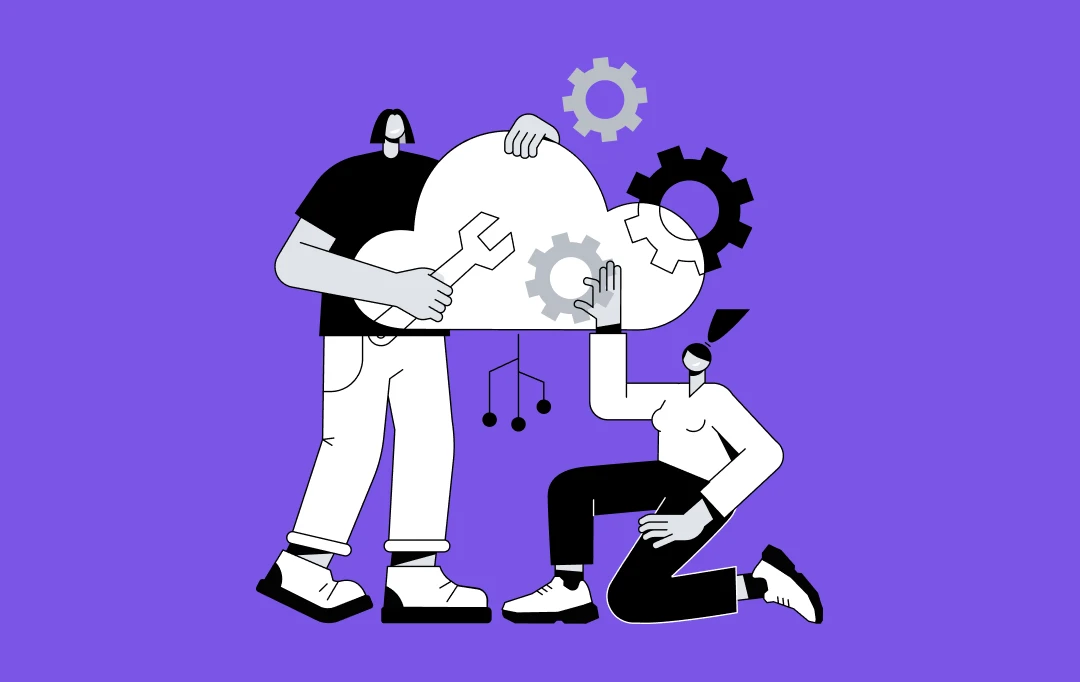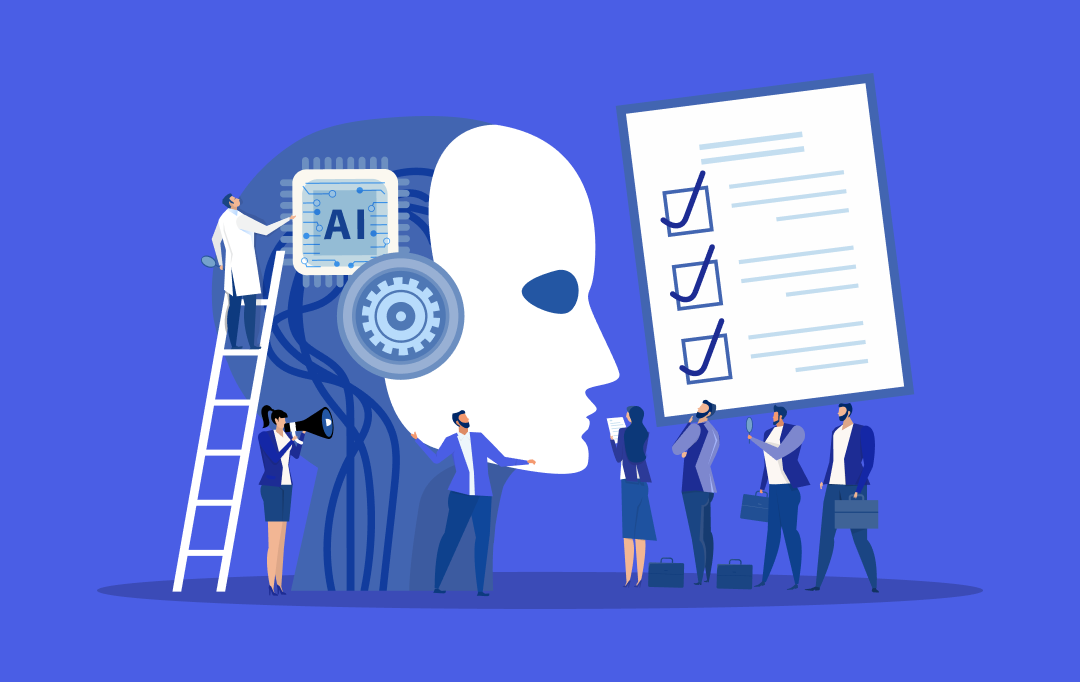- Top Use Cases of AI in Media and Entertainment
- Gaming
- Podcasts
- Personalized Content Recommendations
- Sentiment Analysis
- Voice Recognition
- Book Publishing
- Film
- Marketing and Advertising
- Revolutionary Benefits of AI in the Media and Entertainment Industry
- Personalized Content Recommendations
- Content Creation and Automation
- Enhanced Viewer Experience
- Improved Audience Insights
- Targeted Advertising
- Cost Reduction
- Real-World Examples: AI's Impact In the Media and Entertainment Realm
- Netflix
- Amazon Prime
- Gullybeat
- AI Agent/Copilot Development for Media and Entertainment
- Future Trends in the Media and Entertainment Industry
- Hyper Personalization
- AR and VR
- AI-Generated Avatars and Virtual News Anchors
- AI Automation in Live Broadcasting
- Detection of Deepfakes
- Final Words
- FAQs
The emergence of artificial intelligence, the technological marvel of our time, opens up an exciting frontier of unparalleled experience for the media and entertainment industry. AI in media and entertainment has become a transformative force, allowing businesses to make the content influential, interactive, and result-driven.
According to the report of PwC, the US leads the global streaming market with impressive growth, expected to reach $75.5 billion by 2027, while China trails with a projected revenue of $25.9 billion.
The profound influence of artificial intelligence has a strong brand presence, customized user experience, and pioneered innovation. AI in media and entertainment has extensively transformed the way content was produced, published, or promoted.
In this article, we will dive deep into the top ten compelling AI use cases in media and entertainment, harnessing the power of artificial intelligence and achieving their business objectives.
Top Use Cases of AI in Media and Entertainment
“Predicting the future isn’t magic, it’s artificial intelligence.”
-Dave Waters, Emeritus Associate Professor of Metamorphic Petrology
One of the incredible methodologies the media and entertainment industry has leveraged is integrating data-driven insights to navigate the modern consumer-centric marketplace. Consequently, AI in media provides opportunities for businesses to enhance customer experience.
Let’s discover some of the most popular AI use cases in the media and entertainment industry.

Gaming
The substantial engagement of audiences in the gaming sector has prompted businesses to allocate significant investments in the media and entertainment industry. The infusion of artificial intelligence (AI) in gaming has wrought a profound revolution in entertainment paradigms. AI-powered NPCs (Non-Player Characters) can demonstrate complex behavior and adapt to player action, ultimately creating a more sophisticated and immersive experience.
Podcasts
Podcasts have gained considerable prominence within the dynamic landscape of technology. By employing strategic content creation, businesses offer a sophisticated channel for information.
Leveraging AI allows the media and entertainment industry to curate engaging, personalized, and interactive content, making it an excellent choice for busy people who can not dedicate time to reading or watching something. AI in podcasting can make audio editing more easier and swifter.
An exceptional component of artificial intelligence, NLP (Natural Language Processing), navigates to analyze and generate human language. NLP is leveraged to transcribe audio into text format, automatically generating subtitles for viewers with hearing impairment. Furthermore, AI in media and entertainment industry is revolutionizing production workflows, enhancing audience engagement, and reshaping the overall landscape of creative podcast content.
Personalized Content Recommendations
Content personalization is one of the AI-driven advancements in the media and entertainment sector, especially in the mobile app development industry. Machine learning programs are leveraged to build an analysis of user preferences, viewing history, and user behavior to give personalized content suggestions. Companies like Disney Plus leverage AI algorithms to provide customized recommendations, increasing user engagement. The accurate AI-enabled directions contribute to user satisfaction and the media and entertainment apps to succeed. The integration of AI in media and entertainment industry is driving innovation and transforming the way content is created and consumed.
Sentiment Analysis
Analyzing sentiments in the media and entertainment industry entails AI in perceiving user emotions demonstrated while viewing and interacting with the content consumed. Considering mobile app development, sentiment analysis helps enhance user engagement by customizing content based on audience reactions. App developers can iterate recommendations, interactive elements, and features by analyzing user sentiments building an emotionally relatable experience. This ace concept paves the way for the media and entertainment industry to be continuously relatable to evolving trends.
Voice Recognition
A subset of NLP (Natural Language Processing), voice recognition helps transform mobile app interactions to facilitate tailored experiences and hands-free control. Effortless navigation, scrolling through content, command initiation, and accessing features with voice commands, these features of voice recognition provide a relatable and smooth user experience. Moreover, the technology improves accessibility for the differently-abled, subscribing to an efficient and inclusive app experience. Incorporating voice search allows for streamlining content discovery, and interactive storytelling and voice-enabled content creation add to user engagement and creativity.
Book Publishing
AI, a formidable player in technology, has etched its footprints by automating repetitive tasks, lowering costs, and making the book publishing process more manageable. From finalizing manuscripts to getting them to readers, AI improves making predictions and workflow. Publishers can efficiently evaluate massive amounts of data and develop the most relevant and exciting content for their readers. AI-powered tools allow publishers to build text based on a set of rules.
AI in the media and entertainment industry can summarize a book and curate a synopsis in a short period. It also assists in producing book layouts and book covers, leveraging machine learning techniques. Based on reader preference, AI can make marketing and distribution channel recommendations.
Film
In this ever-evolving landscape of film-making, AI in entertainment provides a rich blend of advantages to the film industry, reshaping traditional paradigms. Its multidimensional components influence the way films are produced or consumed. AI’s impact on the media and entertainment industry is exceptional due to its art creation, recommendation engines, image upscaling, and more.
AI allows filmmakers to create complex visuals they have never thought of before. The creative vision is improved due to AI in entertainment, for instance, de-age actors. It streamlines the process of post-production as well as pre-production.
Marketing and Advertising

AI is uniquely positioned among technology as it assists in generating leads, improving customer engagement and product demonstration. AI in marketing augments efficiency; tools like ChatGPT can quickly develop content for reports, emails, taglines, and more.
With the integration of AI, marketers, business owners, and stakeholders execute professional design strategies, product engineering, and efficient delivery methods, all aimed at delivering substantial value to end-users. Powerful chatbots, developing campaigns, personalizing content, and automating redundant processes aid the marketing industry in crafting persuasive marketing strategies and meeting their expectations. In addition, artificial intelligence for media & entertainment is advancing operational efficiency, elevating user experiences, and reshaping industry dynamics.
Embrace the future of media and entertainment now; don’t let your business get left behind.
Revolutionary Benefits of AI in the Media and Entertainment Industry
The integration of AI in entertainment industry is transforming how content is created, distributed, and consumed. By leveraging AI technologies, companies can streamline production processes, gain valuable insights into audience behavior, and provide personalized user experiences. As AI and entertainment industry continue to evolve and expand their integration across the operational processes, they offer numerous benefits that enhance both the companies and consumers. Let’s explore some key advantages of AI in entertainment industry.

Personalized Content Recommendations
AI algorithms analyze user behavior to provide personalized recommendations for TV shows, movies, and music, enhancing user engagement and satisfaction.
Content Creation and Automation
AI platforms like ChatGPT, SORA, etc., assist entertainment companies in generating scripts, creating and editing videos, and designing graphics. It helps streamline the production process and save time while maintaining high-quality standards.
Enhanced Viewer Experience
AI-powered features like interactive content, chatbots, and voice recognition provide immersive experiences to viewers, enhancing their satisfaction and retention rates.
Improved Audience Insights
AI collects and analyzes large datasets to provide insights into audience preferences, behavior, and trends. The utilization of artificial intelligence in entertainment industry helps media companies make informed decisions and create better content that resonates with audiences.
Targeted Advertising
AI in social media helps businesses in understanding the trends and user data to create targeted marketing campaigns and deliver personalized ads, increasing the effectiveness of advertising campaigns and improving their overall marketing ROI.
Cost Reduction
AI in entertainment industry helps companies cut operational costs in content production and distribution through automation. By automating repetitive tasks, AI helps reduce the reliance on human resources and curtail energy consumption, thus lowering utility costs.
Real-World Examples: AI’s Impact In the Media and Entertainment Realm
The impact of AI in the entertainment industry is vast and growing, with numerous companies leveraging AI and other cutting-edge technologies to improve nearly every area of their operational processes.
While artificial intelligence in media has made a huge impact on the industry, one major area where its role is profound and unavoidable is personalized content creation. For instance, AI algorithms can analyze a vast volume of user data to create personalized content based on audiences’ watch histories and enhance user experience.
Here are some real-world examples of AI’s impact on the media and entertainment industry, propelling businesses to greater heights as never before.
Netflix
One of the leading Internet television networks widely spread across 190 countries has tremendously transformed its technology stack. Netflix has leveraged ML as well as AI to determine bandwidth by analyzing previous view data.
Metadata has become one of the essential sources of information about what and how viewers behave and their emotional state. With the assistance of rich content metadata, Netflix can efficiently target them and build more personalized highlights to direct the users.
Buffering can be a distressing element while you are enjoying your favorite show. Netflix leverages AI through adaptive bitrate streaming, which analyzes Internet connection speed and device capabilities in real-time, resulting in regulated video quality.
Amazon Prime
Amazon has elevated its business through artificial intelligence and machine learning, enabling it to augment operational efficiencies. Alexa is one of Amazon’s popular products. It is a smart speaker available in 15 languages and 80 countries, constantly elevating business through crafting tailored content.
Gullybeat
We have developed an app, Gullybeat, allowing every street rapper to showcase their talent. It provides users to discover new music and karaoke-style rap with interactive designs and typography.
AI Agent/Copilot Development for Media and Entertainment
The media and entertainment industry is rapidly embracing AI agents and copilots to revolutionize operations, boost efficiency, and enhance strategic decision-making. These intelligent assistants are custom-built to streamline various processes, helping companies save time, optimize resources, and gain a significant competitive edge in a dynamic landscape.
For enterprise-level operations, the impact is particularly profound, enabling scalability and precision that manual processes simply cannot match. AI agents and copilots provide powerful capabilities that directly translate into tangible benefits for media enterprises:
- Content Analysis: They perform comprehensive media data analysis, generate detailed content reports, and identify potential content opportunities based on predefined criteria. By processing historical and real-time data, these agents also pinpoint audience trends, helping to predict future content preferences.
- Audience Engagement: AI tools analyze audience data and past interactions to deliver highly personalized content recommendations. They automate routine communications like show reminders and updates, and offer 24/7 virtual assistance to answer audience queries and provide basic information, significantly enhancing user experience.
- Compliance and Rights Management: For large organizations, managing complex regulations is critical. AI agents automate regulatory document analysis, ensuring compliance with ever-evolving rules. They monitor vast content portfolios for adherence to predefined policies, automate documentation and reporting, and flag any potential compliance violations or discrepancies, reducing legal risks.
- Process Automation: Repetitive and time-consuming tasks are prime candidates for AI. These agents automate data entry, report generation, data validation, verification, content onboarding, and metadata management processes, freeing up human capital for more strategic tasks.
- Content Planning: By gathering and analyzing data from diverse sources, AI provides content planners with a holistic view of audience preferences. They recommend content scheduling and prioritization based on audience insights and historical performance, and offer real-time insights into market conditions and content performance, supporting timely and informed decision-making.
- Content Distribution and Optimization: AI agents recommend optimal content distribution strategies based on sophisticated models. They identify imbalances in content libraries, suggest rebalancing actions, and optimize content delivery across various platforms based on audience engagement data, ensuring content reaches the right audience at the right time.
- Fraud Detection: They continuously monitor media transactions for predefined patterns or rules associated with potential fraud, flagging suspicious activities based on predefined criteria or models, thus safeguarding revenue streams.
- Marketing and Content Generation: AI agents assist in generating personalized marketing communications or promotional materials using templates and structured data. They also help with content creation for websites, social media, and marketing campaigns within defined parameters, boosting outreach efficiency.
- Customer Segmentation and Targeting: By analyzing audience data, AI segments viewers based on demographics, viewing preferences, and engagement levels. This enables businesses to identify potential cross-promotion or upselling opportunities based on precise audience segments.
AI agents and copilots don’t just increase the efficiency of operational processes; they significantly enhance the quality of customer service and strategic decision-making. By integrating these advanced AI solutions into their existing infrastructure, media and entertainment companies, especially large enterprises, can achieve a substantial competitive advantage, navigating the complex media landscape with innovative, efficient, and reliable AI-driven tools and strategies.
Future Trends in the Media and Entertainment Industry
As technology continues to advance, the media and entertainment industry is on the verge of a significant digital transformation. Here are some of the most popular technology trends that are set to revolutionize this dynamic sector in the coming years:
Hyper Personalization
By leveraging AI and ML algorithms, media companies can offer personalized recommendations, creating a more engaging and satisfying user experience. This level of hyper-personalization will go beyond what we see today, making content discovery more intuitive and enjoyable.
AR and VR
The integration of Augmented Reality (AR) and Virtual Reality (VR) in the media industry will provide immersive entertainment experiences, allowing users to interact with content in entirely new ways. From VR concerts to AR-enhanced movies, the possibilities are vast and growing, altering the way we consume media.
AI-Generated Avatars and Virtual News Anchors
AI technology will revolutionize the news delivery system by creating AI-generated avatars and virtual news anchors. These lifelike personas can present news in a highly personalized and engaging manner, catering to diverse demographics and languages worldwide.
AI Automation in Live Broadcasting
Automation will enhance live broadcasts and automate operations by handling real-time tasks like closed captioning, dynamic graphics, and overlays, improving content accessibility and quality. This level of automation not only improves content accessibility but also ensures high-quality broadcasts that captivate audiences.
Detection of Deepfakes
AI in media industry helps in detecting deepfakes is crucial for maintaining authenticity and trust in the media industry. As deepfake technology continues to evolve rapidly, AI algorithms will also advance in identifying manipulated content, preserving the integrity of digital media platforms, and reducing the spread of fake news.
Final Words
With a distinct emphasis on domains like book publishing, AR & VR, Movies, Music, and podcasts, artificial intelligence shines brightly as a beacon, elevating businesses with scalable solutions into an era of rapid technological advancement.
The symbiotic relationship between artificial intelligence and mobile app development has transformed the media and entertainment industry. From deep diving into users’ minds by analyzing sentiments and content preferences, these advancements offer an engaging and immersive experience. The constantly emerging AI technologies will play a pivotal role in shaping the future of mobile app development, thereby generating scope for new opportunities.
As an entertainment app development company, Appinventiv specializes in immersive technology’s spectacular world, constantly researching, planning, and delivering groundbreaking solutions in the global software services arena.
With our AI development services, we aid in strengthening your business in the media and entertainment ecosystem.
Want to know more about AI and the entertainment industry? Let’s connect and take your media company to great heights.
FAQs
Q. How is AI used in entertainment?
A. AI in the media and entertainment industry has a huge impact in various ways. AI-driven tools allow businesses to create engaging and human-centric content. The role of AI in media and entertainment is central, influencing industry dynamics exponentially.
Q. How does AI affect the media and entertainment industry?
A. The role of AI in media and entertainment is pivotal. With an advanced recommendation algorithm, users are provided content according to their preferences.
Q. What is the future of AI in media and entertainment?
A. The future of AI in the entertainment industry is exceptionally optimistic. Deep learning models continuously evolve, leading to more sophisticated and personalized content. Ethical considerations and responsible AI practices will become more significant in the upcoming years.
Q. How does AI help in improving viewer engagement?
A. AI significantly boosts viewer engagement by offering hyper-personalized content recommendations based on individual viewing history and preferences. It also enables adaptive content, real-time interactive features like smart chatbots, and optimized ad targeting, creating a more tailored and immersive experience that keeps viewers watching longer.
Q. What are the ethical concerns of using AI in entertainment?
A. Key ethical concerns include of using AI in entertainment include:
Bias and Misrepresentation: AI algorithms, if trained on biased data, can perpetuate stereotypes or misrepresent certain demographics in content, leading to unfair portrayals.
Consent and Ownership: Significant concerns arise around using AI to create or alter likenesses of individuals (like deepfakes or recreating deceased actors) without explicit consent, blurring lines of intellectual property and personal rights.
Transparency: There’s a growing need for clear disclosure about when and how AI is used in the creation or alteration of entertainment content to maintain audience trust.
Impact on Human Labor: The automation capabilities of AI raise concerns about job displacement for writers, actors, VFX artists, and other creative professionals in the industry.
Q. How is generative AI being used to create music and film content?
A. Generative AI is transforming content creation by automating tasks and generating new material. In music, it composes original scores, creates background music, and assists with sound design. In film, it’s used for script inspiration, automating visual effects, generating digital duplicates (like de-aging actors), and even creating entire animated scenes, speeding up production and reducing costs.
Q. How do streaming platforms like Netflix and Spotify use AI?
A. Netflix and Spotify heavily use AI for personalized recommendations. They analyze vast amounts of user data, including viewing/listening history, genres, skips, pauses, and even time of day, to suggest movies, shows, and music. This AI-driven personalization extends to tailored user interfaces and targeted advertising, enhancing user experience and retention.
Q. How much does it cost to develop an AI-based media platform or app?
A. The cost to develop an AI-based media platform or app varies widely, typically from $40,000 for a basic app with simple AI features to over $500,000 for complex, enterprise-level solutions.
Factors like the app’s features (e.g., advanced recommendation engines, generative capabilities), AI model complexity, UI/UX design, development team’s location, and ongoing maintenance significantly influence the final price.


- In just 2 mins you will get a response
- Your idea is 100% protected by our Non Disclosure Agreement.
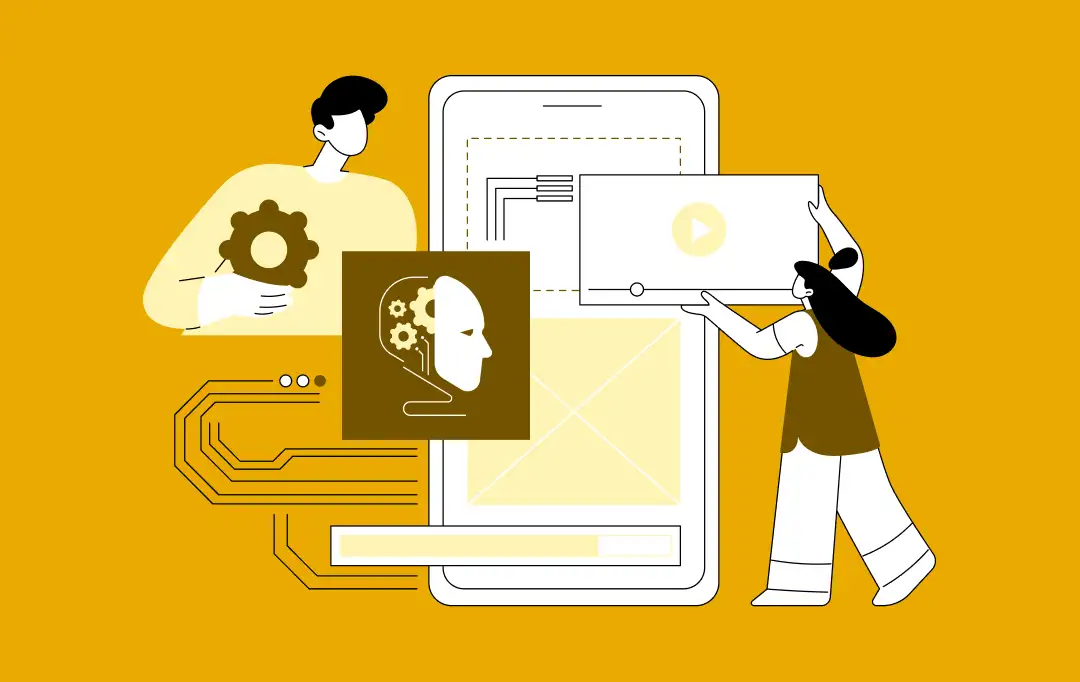
From Chatbots to AI Agents: Why Kuwaiti Enterprises are Investing in AI-Powered App Development
Key Takeaways Kuwaiti organizations are moving beyond basic chatbots to deploy AI agents that handle tasks, analyze data, and support operations intelligently. National initiatives such as Vision 2035 and CITRA regulations are creating a structured environment for AI-powered app development in Kuwait. Businesses in key sectors like banking, oil and gas, retail, and public services…
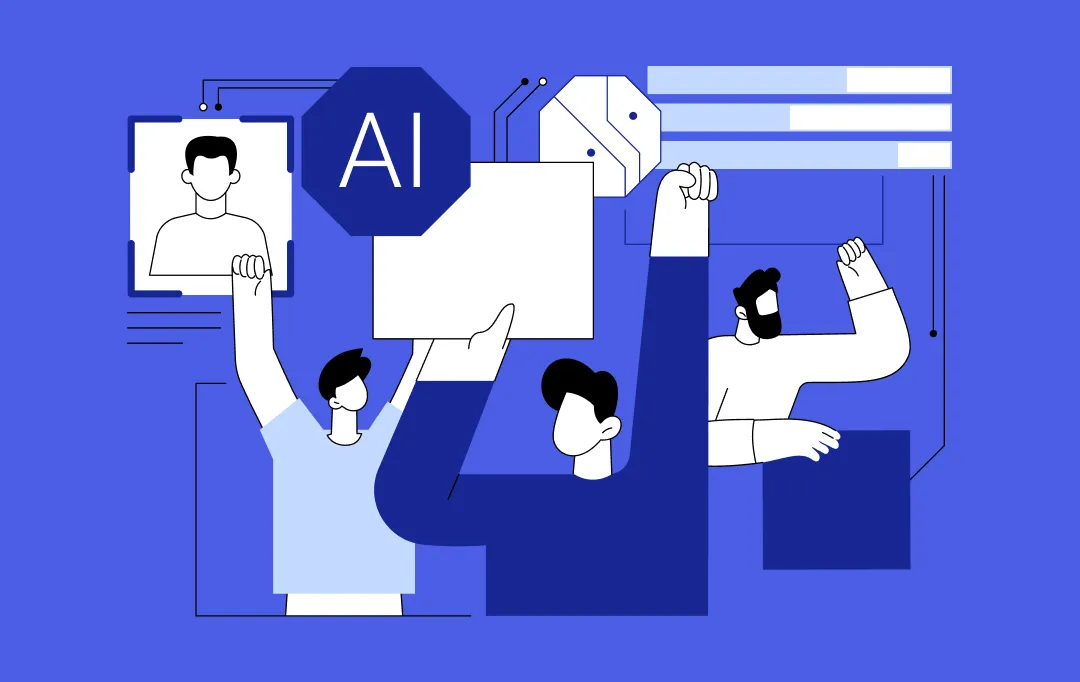
Beyond the Hype: Practical Generative AI Use Cases for Australian Enterprises
Key takeaways: Enterprises in Australia are adopting Gen AI to address real productivity gaps, particularly in reporting, analysis, and service delivery. From banking and pharmaceutical to mining and agriculture, Gen AI is applied across industries to modernise legacy systems and automate knowledge-intensive and documentation-heavy workflows. The strongest outcomes appear where Gen AI is embedded into…
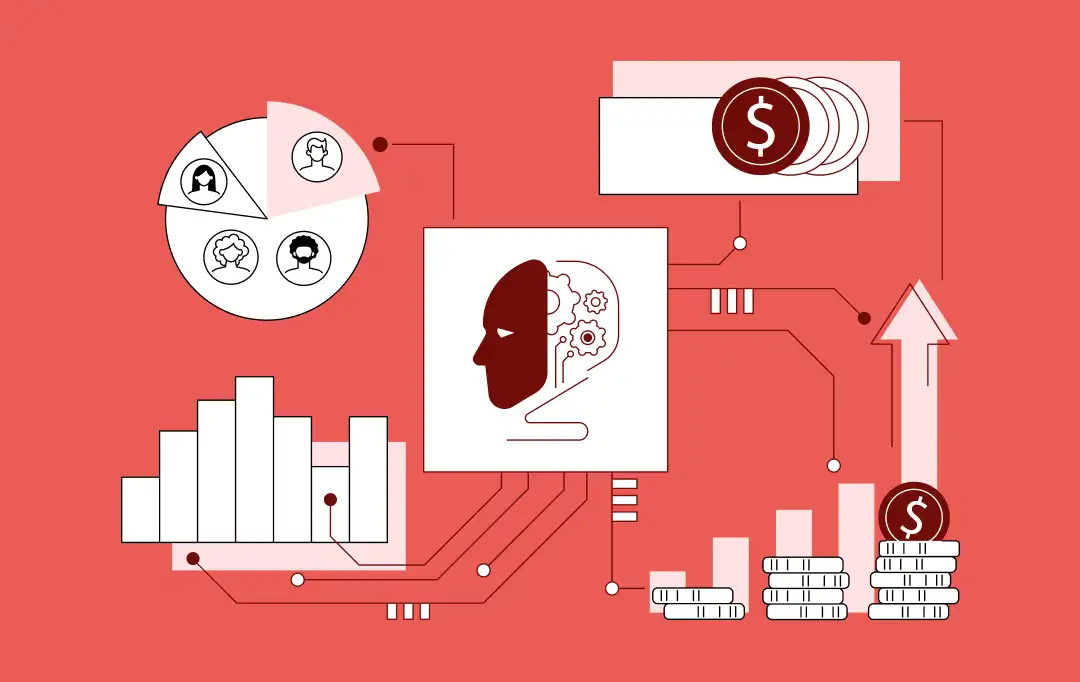
The ROI of Accuracy: How RAG Models Solve the "Trust Problem" in Generative AI
Key takeaways: RAG models in generative AI attach real, verifiable sources to model outputs, which sharply cuts hallucinations and raises user confidence. Accuracy directly impacts ROI, driving fewer escalations, faster decision cycles, and lower support costs. RAG vs fine-tuning: RAG allows real-time updates without retraining, offering faster deployment and lower maintenance. Vector databases for RAG…






















